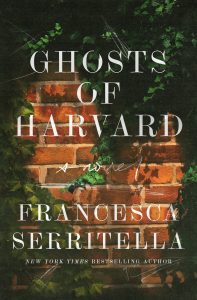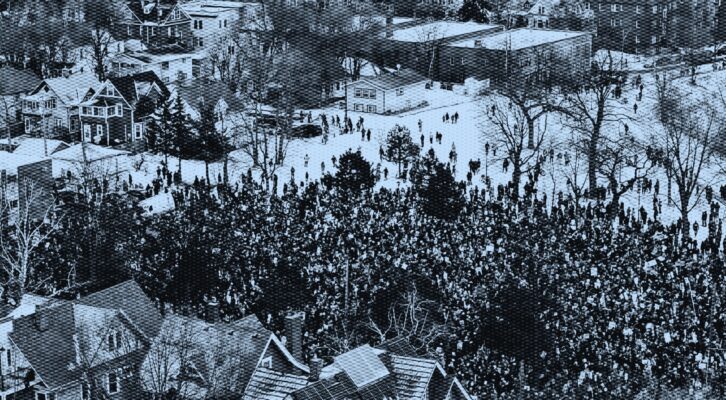Other people, even the ones we love, are a mystery. Familiarity dampens curiosity, we can take family for granted, and so sometimes those closest to us remain the least fully known. It’s only after they’re gone that we crave the chance to fill in every blank. We don’t think to ask the questions until they can no longer be answered. After you lose someone, your only choice is to look for the clues they leave behind.
My grandmother was like a second mother to me. I was her only grandchild, and she took care of me every day after elementary school until my single mom got home from her then-job as a judicial law clerk. Even after my grandmother moved down to Miami with my uncle, we stayed especially close. My family called me “the grandmother-whisperer” because my grandmother could be exceptionally stubborn, and I had a special way of getting through to her. And in most cases, I took her side. I could mimic her expressions so well, my mother said I “channeled” her.
But she retained an air of mystery. She didn’t open up about her impoverished childhood or the short, fraught, marriage before my grandfather. Instead, she called herself a witch with half-seriousness, believed she possessed powers over the malocchio, the evil eye. She told me these powers would skip a generation and pass to me. We never really knew whether she was kidding. Although she didn’t anoint herself with only the powers of Old-World Italy. Layered beneath her crucifix, she always wore an Egyptian cartouche pendant with hieroglyphs. She could’ve gotten it from the museum gift shop, but she wore it like a family heirloom. I remember staring at it as a child, cuddled close to her chest. What did those hieroglyphs mean? Did she even know? Did it matter? I never thought to ask, because somehow, it suited her. She was already not the typical grandmother: she was divorced, not widowed; salty, not sweet. She was warm and funny, but she carried all four-foot-ten of herself with Napoleonic authority.
I didn’t question her; I admired her.
But looking back, I wonder, how did a poor Italian girl from South Philly, raised during the Great Depression, the youngest of nineteen children, abused by her mother, on her own by age fifteen, feel a kinship with an ancient Egyptian queen? Was laying claim to a more remote, noble, universal lineage her way of rejecting the horror of her more immediate heritage? How did she raise herself to be the loving mother and matriarch she never had? How did she build that strength and confidence from the inside out?
My mother said she doesn’t know where the necklace is now, my uncle might have given it to a friend. I wish I had asked my grandmother those questions. But now that I can’t, I wish I had that clue.
I think when we lose someone, we always look for hieroglyphs, symbols, signs. I carried my grandmother’s influence into my debut novel, Ghosts of Harvard. My protagonist, Cady Archer, and her beloved older brother, Eric, recall a childhood visit to a King Tut exhibit—the same one I visited with my grandmother—which inspired Eric to create his own hieroglyphic alphabet so the siblings could leave each other secret messages and missions. Later, when her brother is at Harvard, he develops schizophrenia and ultimately dies by suicide on campus. In that aftermath, Cady’s relationship with the person she loved best becomes a riddle. When Cady attends Harvard herself, she brings with her Eric’s physics notebook, which she hopes will offer insight into his mind during his final year. What she finds is more encrypted messages, evidence of alternative dimensions, and a mystery more profound and perilous than she could ever have imagined.
My grandmother is at the top of my mind during this pandemic, because the last time I was at this particular “scene,” temporarily living in my mother’s house, also unexpectedly and with great uncertainty, medical concerns, and grief, also at this exact time of year was when I abruptly moved home to help my mother and uncle care for my grandmother during her hospice for terminal cancer. Then, like now, I didn’t know how long I would be transplanted. Then, like now, I rarely left the house that hadn’t been my home since I was in high school. Then, like now, I knew that as sad and drained as I felt, we had more grief coming.
I came home in February and she passed in April. With the perspective of this pandemic, I see how lucky I was to get that time and to get to be physically close to her at all. I remember the strange dissonance of grieving in springtime, I put that in Ghosts of Harvard, and I feel it again now with the terror of this pandemic against the backdrop of sunshine and green buds. My heart breaks for the many people who now must be separated from their loved ones during their medical treatment and even death. I feel for their trauma, the disruption of their grieving process, and the suspension of the rituals necessary for comfort and closure. These losses to coronavirus will leave more questions, more mysteries than ever.
But I didn’t need the pandemic to make me grateful for that time. What happened during those three months was the most grueling, beautiful, frightening, cherished, mundane, and profound experience of my entire life.
And not because I spent the time having soul-searching conversations with my grandmother. In fact, because of the cancer in her throat, for some of it she couldn’t speak at all. She wrote her needs on a small whiteboard in a shaky hand, but she mostly used it for jokes and swearing at her kids, like an insult comic on oxygen. (Though never at me, never at her “kitten.”) I didn’t think to tackle the big questions or unravel the mysteries of her life before I was born. I was too busy keeping her clean, fed, and comfortable, mixing thickener into her decaf coffee and Bud Light, procuring the right type of Entenmann’s donuts, and ensuring there was an available episode of her favorite shows ready to go on the TV at high volume. We watched Paternity Court, new for me, highly recommended, and reruns of her favorite sitcoms: Seinfeld, Two and a Half Men, and How I Met Your Mother. She was not interested in watching any new shows or movies, and I didn’t argue. No one needs suspense when facing the greatest unknown of all.
Although I was with my grandmother more than twelve hours a day, I was not with her the moment that she died. She’d had a brutal few days, I knew we had entered a new stage, one in which her body was suffering and her personality and spirit felt far away. Despite the weeks of lead time and lessons of the angelic hospice nurses, it was harder than I had prepared myself for and worse than I had wished for her. I didn’t know if she could tell I was there anymore, but I wanted to be with her. I stayed in a chair by the bed we’d set up in the living room until two in the morning, when I went upstairs to get a few hours of sleep.
And I missed it.
However, what I had instead was the closest thing I’ve ever known to a supernatural experience. All I can say is that somehow, I felt her exit earth at the moment she did.
I sat on the cold tile floor, and my entire body felt hot; I was in agony. And then, just as suddenly, it passed.
I was sleeping and I woke up with a start. I felt like something was ripping through my stomach and chest from the inside out. I hurtled toward the bathroom, certain I was going to be sick, and heaved—but nothing came. I remember I sat on the cold tile floor, and my entire body felt hot; I was in agony. And then, just as suddenly, it passed.
Moments after I’d returned weakly to bed, I heard my uncle’s voice downstairs.
“Mom. Mom?”
I already knew she was gone.
I wish I could tell you I was suffused with a feeling of love and well-being instead of a violent disconnection, a visceral gut-wrench. Maybe the pain I felt was because she did not go willingly, she always was a fighter. Or maybe it came from me, maybe my spirit was the one who didn’t want to let go. But as painful as it was, it was a comfort to me. All I know is that on some plane, we got to hold onto each other until the very last moment.
I know she knew, too.
I share it now in sympathy with those who cannot be with their loved ones at the time of their passing. I believe there are connections we cannot explain or demystify, connections that surpass our knowledge, but that are still very much felt for both people. The bonds we share with our loved ones are not physical or situational, they transcend this dimension.
So maybe we gather clues and pursue mysteries in the material world to keep the conversation going with those we’ve lost. It is our unfinished business, not theirs. But in some dimension, in some other universe, all is known, understood, and forgiven.


















